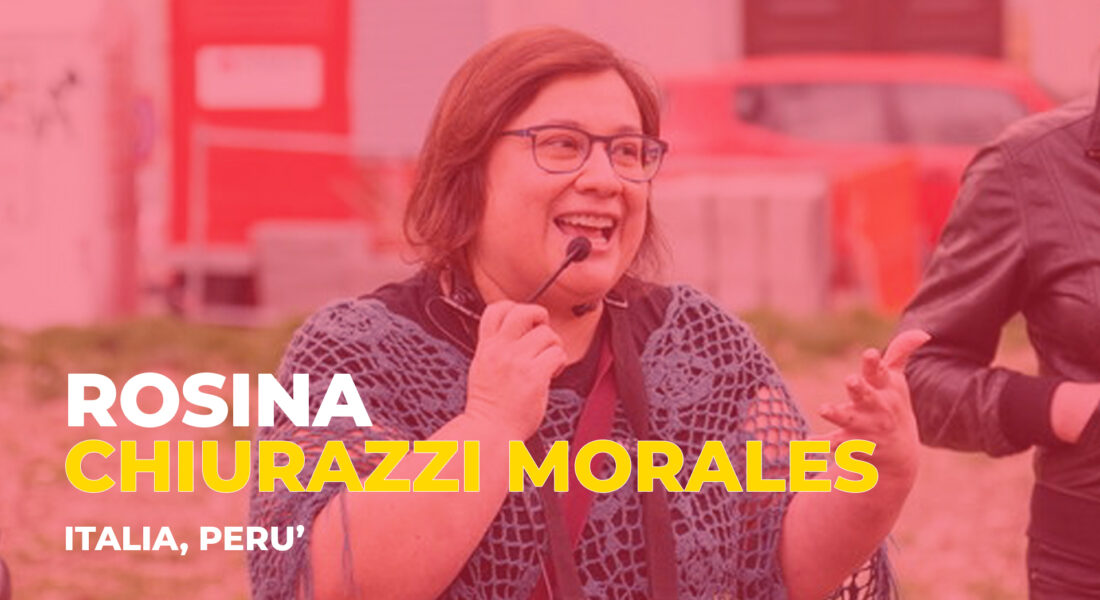
Migrant people are often seen as in need of help or as people who have no knowledge, when in fact they have so much to offer ad teach
These are the words of Rosina, born in Turin (Italy) but with a double surname, a dual citizenship and her heart divided among Italy and Peru.
Her origins range from the Peruvian Ande, and in particular from Callejón de Huaylas, a city of the Ancash region of western Peru and her mother’s city of origin, to the southern Italian territories of Calabria, region of origin of her father. As many of the Italian-Peruvian people, she speaks both Italian and Spanish fluently and she is not only attached to her origins, she feels Peruvian. Here, she participates in cultural events promoted by Peruvian associations, while she manages to travel to Peru often, both for personal and professional reasons. She defines her country as “wonderful, the fruit of the encounter of different cultures” and this is what she likes the most.
Perhaps it is precisely the importance that Rosina gives to people, to her double origins and to the encounter among cultures that made her choose, back in 2009, to join one of the most innovative projects of the city of Turin: Migrantour. This is centered not only on the integration of migrant people on the territory, but also on their first-person protagonism.
Created in Turin by the “Viaggi solidali” cooperative, and in collaboration with NGOs like ACRA and Oxfam Italia, Migrantour is a responsible tourism project that aims to enhance the contribution of people with migrant backgrounds and to encourage the meeting of cultures in the area of Turin. How? By turning these people into ideators and companions of urban itineraries through the city’s intercultural neighborhoods.
At this point Rosina’s role becomes crucial. She involves women, men, girls, boys, guys with a migratory background, or that have migration experiences in their families, encouraging them to launch themselves in the experience of intercultural companions. In so doing, Migrantour becomes a space of mutual exchange and of multicultural encounter, where the guides discover new aspects of the city and, at the same time, find a place where they can, if they are willing to, tell about and confront themselves, debate and express their own ideas or stories.
“My/Our contribute from a social and cultural perspective is to enhance the role of migrations as an element of enrichment of the cultural, social and economic fabric of the country”
Rosina’s words, today project coordinator, give a glimpse of her tenacity and trust in a possible, and not too-distant future, change of the mental schemes of people still permeated by prejudice and distrust. And what better place to spread messages of equality, inclusion, community, solidarity, dialogue than the schools? She is proud to spread Migrantour’s messages in the schools of the territory and today many are the classes that undertake the accompanied intercultural urban routes at the discovery of the city. In addition, as a project born in the field of anthropology, Rosina told us how, back in 2018, it was awarded by the “Società Italiana di Antropologia Applicata” (SIAA, Italian Society of Applied Anthropology) as the best project on the themes of migrations, responsible tourism, access to cultural heritage and urban change.
Through the project, she also succeeds in spreading knowledge on the Peruvian community and to highlight topics such as the Peruvian female migration and the Afro-Peruvian and indigenous claims of yesterday and today.
The benefits of Migrantour spread beyond Turin’s borders. Today it is part of several larger projects, both promoted by ACRA and Viaggi Solidali, as “Le nostre città invisibili. Incontri e nuove narrazioni del mondo in città” (“Our invisible cities. Encounters and new narrations of the world in the city”), of 2018 and financed by the Italian Agency for Cooperation and Development (AICS) and, “New Roots – Migrantour intercultural walks building bridges for newcomers active participation”, born in 2019 and co-financed by the European Union. In the first Migrantour is included in the framework of the fight against erroneous and disriminatory narratives, while the second brought Migrantour in 10 cities of four different countries with the aim of involving mainly newly-arrived people in the different territories.
A study on these two projects was carried out by the University of Bologna and this showed how Migrantour has had a remarkable impact on the Italian society, but, most importantly, on the intercultural companions and this is visible even from their testimonies present on the project website.
“My greater satisfaction is to see how the companions finally feel valued”
A self-esteem that, for Rosina, is born and grows through the sharing of one’s knowledge, the possibility of making the territory known through new perspectives and the intercultural dialogue. All of this is shared by the network of intercultural companions now present in more than 20 cities both in Italy and Europe who, like Rosina, spread Migrantour’s messages on their territories.


